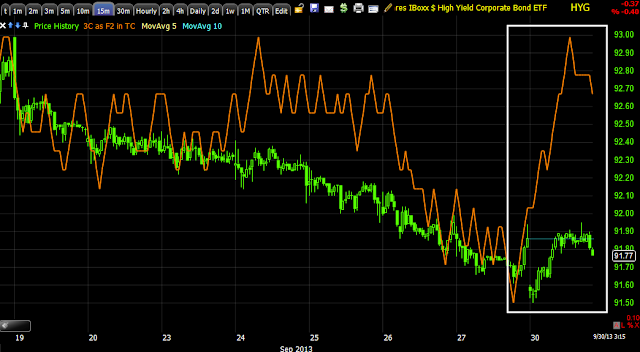Here are some of the more important charts, there's not only a good short term momentum trade (call options), there's a good swing long trade and an even better long term trending short all set up or setting up.
I'll use GDX as the example, but NUGT is the same.
This is a long term 5-day chart, it shows a large "Complex Head and Shoulders" top that is about 3 years in the making. Even complex tops tend to be symmetrical, this one has two left and right shoulders and 4 heads or you might call it one large head.
The long swing or even short trend trade as well as the set up for the long term trend trade set up are already in place.
The 3 areas I'll short a H&S top are very different than the areas Technical Analysis suggests. T.A. NEVER suggests shorting the top of the head as they consider that, "Picking a top", but I'm not trying to pick a top, it just happens to be that when 3C is giving a short signal, it's often at a top so that is the first area that is also the best with the least risk.
The second area is the top of the right shoulder, this still gives you a good price point and lower risk (not as low as the head, but decent).
Technical analysis says to wait for the H&S top to break below the support/neckline, this is the worst place in my view, you are chasing price, you have a lot of upside risk
and most of all, these patterns "use" to test resistance and fail, now they test resistance and break out above the neckline to shake out shorts that entered below the neckline. You can already see the bear flag setting up a large head fake move and capitulation-like volume in the area, this is a perfect set up for the shakeout of shorts
who will remain in the trade at a loss because they expect the neckline to provide resistance when in fact the neck line resistance will fail and price moves above, putting a number of shorts at a loss and covering which sends price even higher, this is the shakeout we see so often now in a H&S top.
This brings us to the last and least favorite place to short a H&S, it's on the move above neckline resistance after a short squeeze pushes price higher, often near the top of a right shoulder. This is the last decent price point entry with lower risk.
So the major 5-day chart's bear flag should fail, a move to the upside should start which will pause at the neckline as more shorts jump in on what they believe will be a successful test of resistance, then price should break above the neckline putting all of the shorts at a loss and creating a snow ball effect of upside momentum as their covering (buying) sends demand up, taking price with it.
When we get there, this is a long term trending short entry.
THE MEASURED MOVE, IMPLIED PRICE TARGET ON THE DOWNSIDE WOULD BE AROUND $11.00 WHICH IS JUST BELOW THE 2009 LOW SO IT'S NOT THAT OUTLANDISH.
The upside move from here should be in the area of $50, this is why I prefer a 3x leveraged long ETF that can be held without the problem of options' Theta (to capture the longer trend)
Volume is VERY important in identifying a true H&S vs. patterns in the clouds that may look like something they are not. In fact, volume is probably the single most important confirmation of a H&S top. Volume should rise on declines and fall on rallies, I drew in where volume lifted on declines at the red arrows as should be. The major volume break below the neckline is shorts coming in, but the more recent, larger volume looks just like capitulation (reversal) volume. It looks like all sellers and shorts have been exhausted and there's little supply left.
Most importantly, look at volume soar in this flag/consolidation area, the exact opposite of what it should be doing in a real consolidation.
On a 15 min chart we see a bear flag that should have led to the next (large) leg lower, it was a head fake that broke to the upside and then a bull flag that should have led to a move higher near the top of the range that was a head fake as well and pulled back more, but no serious damage. The range can be seen, although there's a much larger range in play as well.
3C at the failed flags, in line when it should have been negative if the bear flag was real, a leading neg. divergence at the top of the range to pull price back and a bull flag with a failed break lower that was accumulated Friday in a leading positive divergence.
Friday's 3 min 3C chart at the flag failure.
A strong 5 min leading positive as the lower prices of the failed flag were aggressively accumulated.
This is the 5-day 3C chart of the entire top pattern, notice the strong accumulation in the current flag below the top's neckline? This suggests that price will do exactly what was described near the top of this post.











































